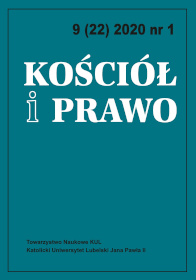The Right to Say Goodbye and Permission to Leave a Penitentiary Facility
Abstract
This study discusses the right to say goodbye regarding the possibility of visiting seriously ill relatives and attending their funeral. Such a right shall apply for prisoners and is protected not only by Polish law, but also by international law, both in the form of hard law provisions, i.e. the European Convention for the Protection of Human Rights and Fundamental Freedoms, as well as soft law, i.e. European Prison Rules and Nelson Mandela Rules.
In this article we can find, the genesis of the right to say goodbye, which was presented by referring to individual judgments of the European Court of Human Rights. Following, the subjective scope of the right to say goodbye was articulated by indicating the authorized entities – who are beneficiaries of this right – and entities deprived of the possibility to use the permit to leave the prison. At the end, guarantees were emphasized to protect the entity against violations of the right to say goodbye.
References
Dąbkiewicz, Krzysztof. 2018. Executive Penal Code. Commentary. Ed. 4. Warszawa: Wolters Kluwer Polska.
Gołaczyński, Jacek, Jacek Mazurkiewicz, et al., ed. 2015. Non omnis moriar. Personal and property legal aspects of human death. Selected issues. Wrocław: Oficyna Prawnicza.
Gronowska, Bożena. 2016. “Long-term imprisonment vs respect for family life of convicts in the jurisprudence of the European Court of Human Rights.” Prokuratura i Prawo 4:5-21.
Hervada, Javier. 2011. “Obowiązki i prawa wiernych świeckich.” In Codex Iuris Canonici. Kodeks Prawa Kanonicznego. Komentarz. Powszechne i partykularne ustawodawstwo Kościoła katolickiego. Podstawowe akty polskiego prawa wyznaniowego. Edycja polska na podstawie wydania hiszpańskiego, ed. Piotr Majer, 215-22. Kraków: Wolters Kluwer Polska.
Jakuszewicz, Adam. 2015. “The issue of burials and deceased person’s memory cult in the jurisprudence of the European Court of Human Rights.” In Non omnis moriar. Personal and property legal aspects of human death. Selected issues, ed. Jacek Gołaczyński, Jacek Mazurkiewicz, Jarosław Turłukowski, et al, 342-63. Wrocław: Wydział Prawa, Administracji i Ekonomii Uniwersytetu Wrocławskiego. Oficyna Prawnicza.
Karska, Elżbieta, ed. 2013. Impact of the European Convention on Human Rights on human rights protection systems and international criminal and humanitarian law. Warszawa: Katedra Ochrony Praw Człowieka i Prawa Międzynarodowego Humanitarnego Uniwersytetu Kardynała Stefana Wyszyńskiego w Warszawie.
Krzeczek, Monika, and Katarzyna Molis. 2017. “A few words on the penalty – general approach.” Studia Prawnicze. Rozprawy i Materiały 1:133-40.
Kuć, Małgorzata. 2015. Lexicon of criminology. 100 basic concepts. Warszawa: Wydawnictwo C.H. Beck.
Lachowski, Jerzy, ed. 2018. Executive Penal Code. Commentary. Ed. 3. Warszawa: Wydawnictwo C.H. Beck.
Lelental, Stefan. 2017. Executive Penal Code. Commentary. Ed. 6. Warszawa: Wydawnictwo C.H. Beck.
Linowski, Krzysztof. 2001. “Possibilities of human development in conditions of penitentiary isolation by maintaining external contacts.” Acta Scientifica Academiae Ostroviensis 8:125-43.
Machel, Henryk. 2010. “Penitentiary resocialization: the essence, terminological dilemmas, social sense, a few theoretical and staff comments.” Resocjalizacja Polska (Polish Journal of Social Rehabilitation) 1:174-92.
Migdał, Jerzy, and Grzegorz Skrobotowicz. 2014. “Possibility of implementing the 2006 European Prison Rules regarding the reintegration model of imprisonment and the overpopulation of Polish penitentiary units.” Roczniki Nauk Prawnych 24, no. 1:109-20.
Mrozek, Kamila. 2018. “Nelson Mandela Rules.” Nowa Kodyfikacja Prawa Karnego 48:169-82.
Nikołajew, Jerzy. 2013. “Minimum Rules and the European Prison Rules vs the right of prisoners to freedom of conscience and religion in Poland.” Studia z Prawa Wyznaniowego 16:111-35.
Nowicki, Marek A. 2017. Around the European Convention. Commentary on the European Convention on Human Rights. Ed. 6. Warszawa: Wolters Kluwer Polska.
Osiński, Leszek. 2018. “Commentary to Art. 204d.” In Executive Penal Code. Commentary, ed. Jerzy Lachowski, 770. Warszawa: Wydawnictwo C.H. Beck.
Płatek, Monika. 2008. “2006 European Prison Rules.” Państwo i Prawo 2:3-17.
Postulski, Kazimierz. 2016. Executive Penal Code. Commentary. Ed. 6. Warszawa: Wolters Kluwer Polska.
Szczygieł, Grażyna B. 2013. Permits to leave the prison temporarily in the Polish penitentiary system. Białystok: Temida 2.
Śliwowski, Jerzy. 1984. “Abolitionist and extremely critical tendencies in penitentiary studies.” In Problemy współczesnej penitencjarystyki w Polsce, vol. 1, ed. Brunon Hołyst, 5-30. Warszawa: Wydawnictwo Prawnicze.
Wedeł-Domaradzka, Agnieszka. 2016. “The right to contact family of persons arrested and serving a prison sentence – consideration of soft law standards and Art. 8 of the ECHR.” Polski Rocznik Praw Człowieka i Prawa Humanitarnego 7:301-18.
Wierzbicki, Piotr. 1984. “Contacts of convicts with the outside world and their importance in social re-adaptation.” In Problemy współczesnej penitencjarystyki w Polsce, vol. I, ed. Brunon Hołyst, 126-37. Warszawa: Wydawnictwo Prawnicze.
Zgoliński, Igor. 2018. “Commentary to the art. 141a.” In Executive Penal Code. Comments, ed. Jerzy Lachowski, 545-50. Warszawa: Wydawnictwo C.H. Beck.
Zubik, Marek. 2007. “Subjects of constitutional freedoms, rights and obligations.” Przegląd Legislacyjny 2:26-43.
Copyright (c) 2020 Kościół i Prawo

This work is licensed under a Creative Commons Attribution-NonCommercial-NoDerivatives 4.0 International License.





